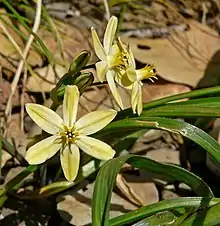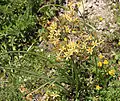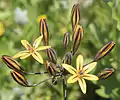Triteleia ixioides
Triteleia ixioides, known as prettyface[1] or golden star,[2] is a monocotyledon flowering plant in the genus Triteleia. It is native to northern and central California and southwestern Oregon, where it can be found in coastal and inland coniferous forests and other habitat. It is a perennial wildflower growing from a corm. It produces one to two basal leaves up to 50 centimeters long by 1.5 wide. The inflorescence arises on an erect stem up to 80 centimeters tall. It is an umbel-like cluster of several flowers each borne on a pedicel up to 7 centimeters long. The flowers are variable in size, measuring one to nearly three centimeters in length. They are pale to bright yellow, or sometimes purple-tinged white. There are six tepals with darker midveins in shades of green, brown, or purple. The lobes are funnel-shaped and may open flat or somewhat reflexed. The six stamens form a fused tube that protrudes from the corolla; they have broad, flat filaments and whitish, yellowish, or blue anthers.
| Triteleia ixioides | |
|---|---|
 | |
| ssp. scabra | |
| Scientific classification | |
| Kingdom: | Plantae |
| Clade: | Tracheophytes |
| Clade: | Angiosperms |
| Clade: | Monocots |
| Order: | Asparagales |
| Family: | Asparagaceae |
| Subfamily: | Brodiaeoideae |
| Genus: | Triteleia |
| Species: | T. ixioides |
| Binomial name | |
| Triteleia ixioides | |
| Synonyms | |
|
Brodiaea lutea | |
There are about five subspecies: Triteleia ixioides subsp. anilina, Triteleia ixioides subsp. cookii (Cook's prettyface), Triteleia ixioides subsp. ixioides (golden brodiaea), Triteleia ixioides subsp. scabra, and Triteleia ixioides subsp. unifolia.
 Triteleia ixioides subsp. analina, plant (eastern High Sierras)
Triteleia ixioides subsp. analina, plant (eastern High Sierras) Triteleia ixioides subsp. unifolia
Triteleia ixioides subsp. unifolia Triteleia ixioides subsp. analina, flowers, showing blue anthers, fused tube, and brown-striped, yellow flowers and buds
Triteleia ixioides subsp. analina, flowers, showing blue anthers, fused tube, and brown-striped, yellow flowers and buds
Notes
- "Triteleia ixioides". Natural Resources Conservation Service PLANTS Database. USDA. Retrieved 16 December 2015.
- Everett. Thomas H., ed. (1982). "Triteleia". The New York Botanical Garden Illustrated Encyclopedia of Horticulture. 10, Ste–Zy. New York: Garland. p. 3409. ISBN 978-0-8240-7240-7.